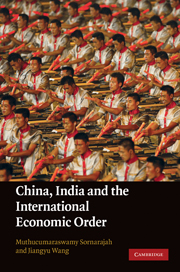Introduction and overview
China, India and the international economic order
Published online by Cambridge University Press: 03 May 2011
Summary
The rise of China and India as global economic powers has now become conventional wisdom. A recent Financial Times report, quoting the International Monetary Fund (IMF), observes that “the striking thing about the global economy [in 2007] is how little it relies on the U.S. as the main engine of growth. For the first time in 2007, China's rapidly expanding economy has provided the largest contribution to global growth, while half of the world's expansion over the past year has come from three countries: China, India and Russia.” And the implication is this phenomenon's lasting impact on the evolving international economic order. As Martin Wolf notes, “[t]he economic rise of Asia's giants is … the most important story of our age. It heralds the end, in the not too distant future, of as much as five centuries of domination by the Europeans and their colonial offshoots.”
In June 2006, an international symposium was held at the Faculty of Law, National University of Singapore, to study the resurgence of China and India as world powers from the perspective of international economic law and development.
- Type
- Chapter
- Information
- China, India and the International Economic Order , pp. 1 - 14Publisher: Cambridge University PressPrint publication year: 2010



